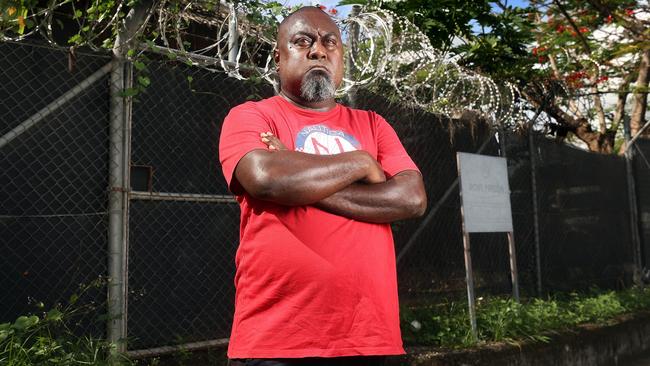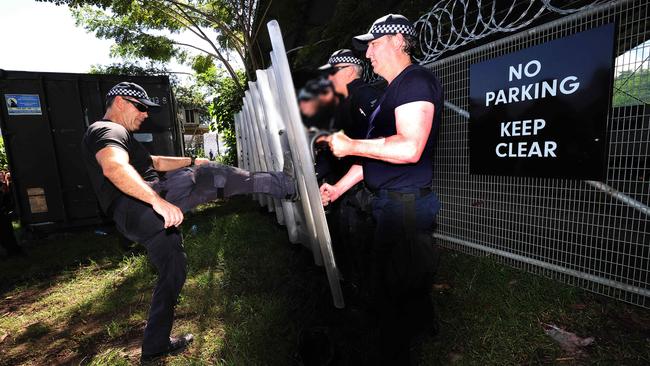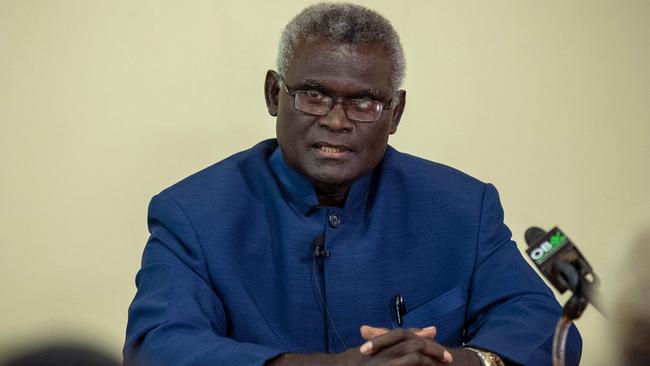Chinese money used to sway MP votes for Solomon Islands Prime Minister Manasseh Sogavare
Payments from a Chinese slush fund are being used to lock in the support of MPs for Solomon Islands PM Manasseh Sogavare, ahead of a no-confidence motion in him.

Payments from a Chinese slush fund are being used to lock in the support of MPs for Solomon Islands Prime Minister Manasseh Sogavare, ahead of a no-confidence motion in his leadership on Monday that could set off further violence in the country.
Australian Federal Police members – part of a 116-strong Australian peacekeeping force – practised with riot shields in Honiara on Sunday, in preparation for potential security flare-ups following the vote.
The Australians, with 50 Fijian and 50 Papua New Guinean peacekeepers, were joined in the Solomon Islands capital by a newly arrived contingent of 65 New Zealand soldiers.
The promised payments from the country’s National Development Fund, worth $SBD250,000 ($44,000), will allegedly only be paid to those who back Mr Sogavare in the looming vote, according to multiple Solomon Islands MPs.
Mr Sogavare has complete discretion over payment of the Chinese-supplied cash, which is transferred directly into MPs’ bank accounts.
Solomon Islands MP Silas Tausinga was one of four government MPs who refused the payment, defecting to the opposition ahead of the vote.
“I knew if I moved I wasn’t going to get it,” Mr Tausinga said. “But for me it wasn’t about the money anymore, it was about the principle.”
Government MPs were asked to apply for the NDF money just before the riots that erupted in Honiara three weeks ago.
“It is never paid out to the members of the opposition; only to the ministers and government backbenchers,” Mr Tausinga said.
“At different points it is used as a way of saying ‘whoever leaves here is not going to get it’. From what I have heard in the last two days, it is not going to be paid until after (the vote). They are using it as a political tool, as leverage.”
Mr Sogavare – a longtime critic of Australia who has forged strong relations with China – requested the foreign security presence under a 2017 treaty with Australia, amid rioters’ demands for his resignation.

The capital was hit by widespread looting and the torching of at least 56 buildings last month, with losses estimated at $SBD227m, after a rampage by protesters from Malaita Province and others dissatisfied with the Sogavare government.
Mr Sogavare, whose government is said to retain 34 of 49 sitting MPs, appears likely to retain his prime ministership in Monday’s vote, despite discontent in sections of the community over his government’s performance.
The NDF was initially set up by Taiwan before the Solomon Islands’ diplomatic switch to China in 2019. It was intended to provide funding for specific development projects as directed by the prime minister of the day. Money for the fund has since been provided by China.
Opposition Leader Matthew Wale said government MPs had been speaking openly about their impending payments.
“The idea is to hold them in to the Prime Minister,” Mr Wale said. “They can use it personally. Some will use it for constituency business. I can’t match it, but I think that is the expectation. Of course I am not interested in such a thing. If that is what will decide their votes, well it is on them.”
Mr Sogavare’s office said in a statement that the opposition’s allegations about the use of the fund in the lead-up to the vote were “outrageous”. It confirmed the NDF was “not new”, and that “unlike Taiwan, (China) will discontinue the NDF next year onwards and this year’s payments are the final tranches of the fund”.
“(The) Leader of Opposition knows the nature of this funding as he used to enjoy it during his time as a minister of the crown,” the statement said.
“It is a further acknowledgment of his sheer ignorance that he decided to come up with this old and petty argument.”
Mr Wale said funds from “the same China money” had been allocated a week before the November riots to two MPs to hold for ex-militants from Guadalcanal and Malaita to keep the lid on planned protests. He said Guadalcanal former militants were promised $SBD1m to help keep the peace before last week’s riots, while the same amount was pledged to Malaitan ex-militants to stay out of the civil unrest sparked by fellow Malaitans.
Mr Sogavare’s office said that money was allocated as “project funding”.
Mr Tausinga joined longtime friend Peter Kenilorea Jnr on the opposition benches. Both are second-generation MPs whose fathers served in parliament together.
Mr Kenilorea said the NDF had also been used to provide payments to government MPs earlier this year, which became public knowledge when a letter from Mr Sogavare authorising the transactions leaked.
He said the influence of “money politics” in the Solomon Islands hit a high around the time of the diplomatic switch from Taiwan to China, with alleged payments of $SBD2m-$SBD5m for MPs who supported Beijing.
The Financial Times reported in 2019 that the state-owned China Civil Engineering Construction Corporation had financed Mr Sogavare’s re-election campaign.
Mr Kenilorea, whose father was the country’s first prime minister after independence, said: “For me, I haven’t been approached (to receive a payment), and I take that as a badge of honour. Nobody wants to approach me because I will immediately report them.”
While Scott Morrison has declared Australian personnel will be in the country for a matter of weeks, Solomon Islanders are referring to the foreign presence as “RAMSI 2” – a reference to the decade-long Assistance Mission to Solomon Islands that cost Australian taxpayers $2.6bn.
Mr Tausinga said lingering tensions over the Solomon Islands diplomatic switch to recognise China rather than Taiwan were a symptom of wider concerns with the government over the nation’s uneven development and its lack of job opportunities.
“I am grateful that RAMSI has come back, but we need to find a political solution to the current standoff,” he said.
“The people want change. It is unfortunate what has happened to the town, but sometimes … you have to listen to the people.”
ANU distinguished fellow James Batley, a former Australian high commissioner to the Solomon Islands, said he understood the NDF, unlike the nation’s Constituency Development Fund, was “not on the books”.
Mr Batley said money had played a big role in Solomon Islands politics since the 1980s, and was initially believed to flow from the country’s logging industry.
“It is part of the way Solomon Islands politics is played. It’s not necessarily played only on one side,” he said.







To join the conversation, please log in. Don't have an account? Register
Join the conversation, you are commenting as Logout